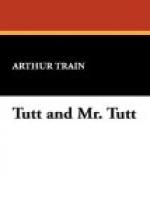Inside Mr. Tutt was a benign and rather mellow old fellow, with a dry sense of humor and a very keen knowledge of his fellow men. He made a good deal of money, but not having any wife or child upon which to lavish it he spent it all either on books or surreptitiously in quixotic gifts to friends or strangers whom he either secretly admired or whom he believed to be in need of money. There were vague traditions in the office of presents of bizarre and quite impossible clothes made to office boys and stenographers; of ex-convicts reoutfitted and sent rejoicing to foreign parts; of tramps gorged to repletion and then pumped dry of their adventures in Mr. Tutt’s comfortable, dingy old library; of a fur coat suddenly clapped upon the rounded shoulders of old Scraggs, the antiquated scrivener in the accountant’s cage in the outer office, whose alcoholic career, his employer alleged, was marked by a trail of empty rum kegs, each one flying the white flag of surrender.
And yet old Ephraim Tutt could on occasion be cold as chiseled steel, and as hard. Any appeal from a child, a woman or an outcast always met with his ready response; but for the rich, successful and those in power he seemed to entertain a deep and enduring grudge. He would burn the midnight oil with equal zest to block a crooked deal on the part of a wealthy corporation or to devise a means to extricate some no less crooked rascal from the clutches of the law, provided that the rascal seemed the victim of hard luck, inheritance or environment. His weather-beaten conscience was as elastic as his heart. Indeed when under the expansive influence of a sufficient quantity of malt extract or ancient brandy from the cellaret on his library desk he had sometimes been heard to enunciate the theory that there was very little difference between the people in jail and those who were not.
He would work weeks without compensation to argue the case of some guilty rogue before the Court of Appeals, in order, as he said, to “settle the law,” when his only real object was to get the miserable fellow out of jail and send him back to his wife and children. He went through life with a twinkling eye and a quizzical smile, and when he did wrong he did it—if such a thing is possible—in a way to make people better. He was a dangerous adversary and judges were afraid of him, not because he ever tricked or deceived them but because of the audacity and novelty of his arguments which left them speechless. He had the assurance that usually comes with age and with a lifelong knowledge of human nature, yet apparently he had always been possessed of it.
Once a judge having assigned him to look out for the interests of a lawyerless prisoner suggested that he take his new client into the adjoining jury room and give him the best advice he could. Mr. Tutt was gone so long that the judge became weary, and to find out what had become of him sent an officer, who found the lawyer reading a newspaper beside an open window, but no sign of the prisoner. In great excitement the officer reported the situation to the judge, who ordered Mr. Tutt to the bar.




